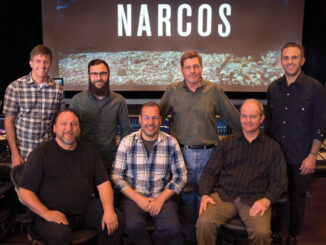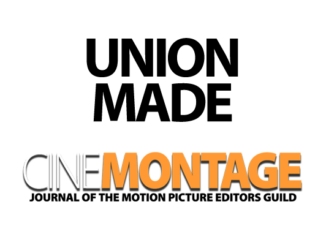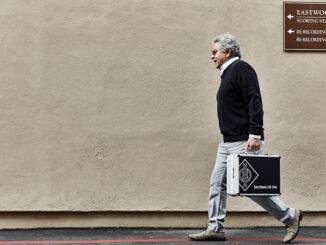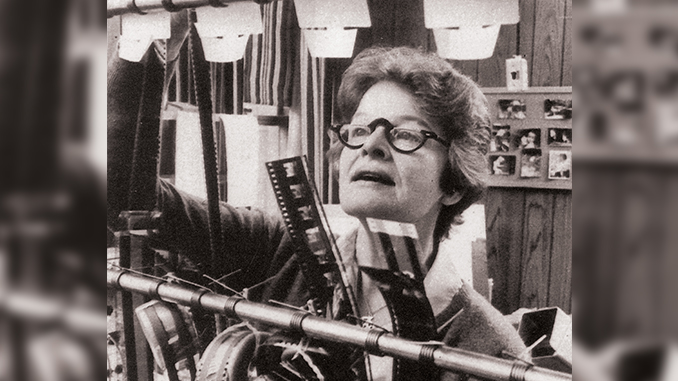
by Mia Goldman
Go to Part 1.
Coming from the “Golden Age” of New York picture-making, Dede Allen has cut such films as The Hustler, Bonnie and Clyde, Alice’s Restaurant, Little Big Man, Serpico, Dog Day Afternoon, Reds, The Breakfast Club, The Milagro Beanfield War and The Addams Family. For most of the nineties, she worked as an executive at Warner Brothers, consulting with both the studio and various filmmakers in post-production. In our last issue, Dede talked about some of her experiences using an Avid for the first time on The Wonder Boys with director Curtis Hanson. She also offered many insights about the issues that digital tools raise for studios and directors. In this, the second part of that conversation, she discusses some of the new pressures that have affected editors, the increasing use of editors as film doctors and the changing hierarchy of the cutting room for assistants.
Mia Goldman: Years ago, when I was an assistant, I remember you likening the challenge of editing to sculpting. You quoted Michelangelo, who said, ‘To make the David, I cut away everything that wasn’t the David.’
Dede Allen: Editing is like writing with shots. And writers are people who change their ideas all the time. Ideas evolve. They’re not bound by a formula.
With these tightened schedules, do you see any new changes that have hindered that process, because of budgets and marketing pressures?
The market is changing rapidly and, as a result, younger editors are beginning to cut earlier – they come out of commercials or MTV. What’s happening now is that the studios will let a director hire someone like that, but then they often bring in a well known editor to polish the picture because they feel that they haven’t quite gotten the best out of the material. In addition, the studio gets to save money because they don’t have to pay the better known editor for the duration of the picture. I think it’s hard on the young editors but it’s also difficult for the better-known editors who don’t really want to do this. This didn’t happen on Wonder Boys because we had a strong director, but I’ve seen it happen over and over again when you don’t have a strong director and the studio steps in. As an editor, you want to have a picture you can live with. A picture is something that is born, it’s like a child – it grows with you. You watch it grow to a certain point where it blossoms because of the collaboration and trust between the editor and the director. It’s a very exciting process. Studio interference is more and more common now, although it happened before the digital revolution, too.
“The division of labor is a challenge because there’s so much tangential work that is created by the Avid and then there’s a lot of crossover work such as opticals and music, etc.” – Dede Allen
This interference isn’t just hurting directors, it’s also hurting editors.
Yes, especially editors who come from MTV or commercials and are new to the theatrical, three act format.
So there’s a conflict created between experienced editors and less experienced editors?
Yes. Often the director is opposed to the new person coming in. He or she wants another pass with their editor, but the studio won’t give it to them. Bringing in a new and perhaps more experienced editor puts the younger editor in a position of having to defend their work with the director, but they don’t have the clout and it becomes antagonistic and painful all around.
There’s also the situation where the first editor is very experienced but another editor is brought in by the studio, anyway.
I think that was true even before we got to digital but that situation is also more common now. I remember an awful situation where a very prestigious editor was fired off a picture. They were screening the film and another extremely well known editor was brought in. The lights went up and the first editor turned around – and sitting in the back of the theater, he saw the new editor there and realized that they were about to let him go without a word. It’s devastating when that kind of thing happens. And you don’t know why but very often it’s an inexperienced producer who is fearful or anxious and won’t let the process of finding the film take it’s course.
Good editors can become casualties because the studio will attack the director
through the editor.
That’s right.

Sometimes it’s not the cutting per se that’s the problem, it’s the thinking.
Yes, the thinking. Often, there are cases where the studio is absolutely right in wanting to go in a different direction. For example, you would hope that in the case where a newer director and their first editor hadn’t quite found the bestfilm – that it needed a polish or the characterizations weren’t quite right – you’d hope that the director would be able to welcome the help of another editor. The studio isn’t always wrong, but unfortunately, a system has evolved where editors are expendable. You can always get another person to come in to doctor a film for two or three weeks, but I think doctoring can be a very unpleasant thing to have to do.
On the other hand, it can be very exciting when a director is open to seeing things differently.
It’s hard on directors because they’ve got to try to stay open to another point of view from the start. And most good directors do. But you have to get their trust. I remember how anxious I was when I first worked with George RoyHill – he had had the same editor for a long time, but his editor was ill. I was lucky in that George became very excited when he saw an early scene I cut – I think it was the walking through the mud scene in ‘Slaughterhouse-Five’. I remember he was enthusiastic because it was a totally different approach from what he had thought it would be. He was always open to fresh ideas from then on. But there aren’t many directors with his kind of confidence around right now.
The first film I cut was Choose Me – Alan Rudolph was the director. When we finished the movie he said, ‘You know, I really like it and
I see every single argument we had on the film and they all made it better.’
That’s wonderful. It’s great to disagree, but conversely, when somebody gets consumed that only their way is right or that the schedule is the priority and they don’t allow you to help them find their vision, it can be difficult.
“How you meld ADR with original sound, how you create seemingly infinite but disparate layers to sound – all that takes artistry, and most important, time.” – Dede Allen
Do you think the digital revolution has changed the hierarchy or environment in the cutting room?
Well, I’ve only done one picture, so I can only judge what happened on that picture. There are two distinct jobs for assistants now: one is film and the other is digital. Either one could be the first assistant. However, if the overall job of running the editing room falls to the digital assistant, it seems to me that the job can become overwhelming. Obviously, most top-notch assistants are able to do both, but that would be extremely difficult.
The division of labor is a challenge because there’s so much tangential work that is created by the Avid and then there’s a lot of crossover work such as opticals and music, etc. Sometimes what can happen is that the director will develop an independent relationship with an assistant who is handling the music or the opticals, which very often hurts the other assistant. It’s complicated. Obviously, a well-tuned cutting room, where the people are used to working together – particularly if the first assistant has chosen the second – makes everyone’s work run smoother. Crewing a cutting room is like casting a film. You want to make sure that everyone works well together because you don’t want to burden the director with psychological problems or an unhappy work environment. On big movies it can get especially complicated with three or four digital machines going at once with second editors and three or four assistants, so there needs to be a clarity of position and a respect for each other’s jobs.
I’ve heard about situations where the director feels the need to move very quickly – and they begin to rely on an assistant or a second editor who is proficient and speedy at just implementing an idea, with no discussion…
They’re a pair of hands. For the director, it feels easier because there’s no conflict and no discussion, but that situation can adversely affect the film. In the old days we used to call it paper bagging when a director or a producer would have an editor in another room cutting another version of something. There were directors who did this – sometimes without the knowledge of the main editor. In some cases it could be construed as practical because there’s too much material and not enough time to investigate, but then it should be done openly.
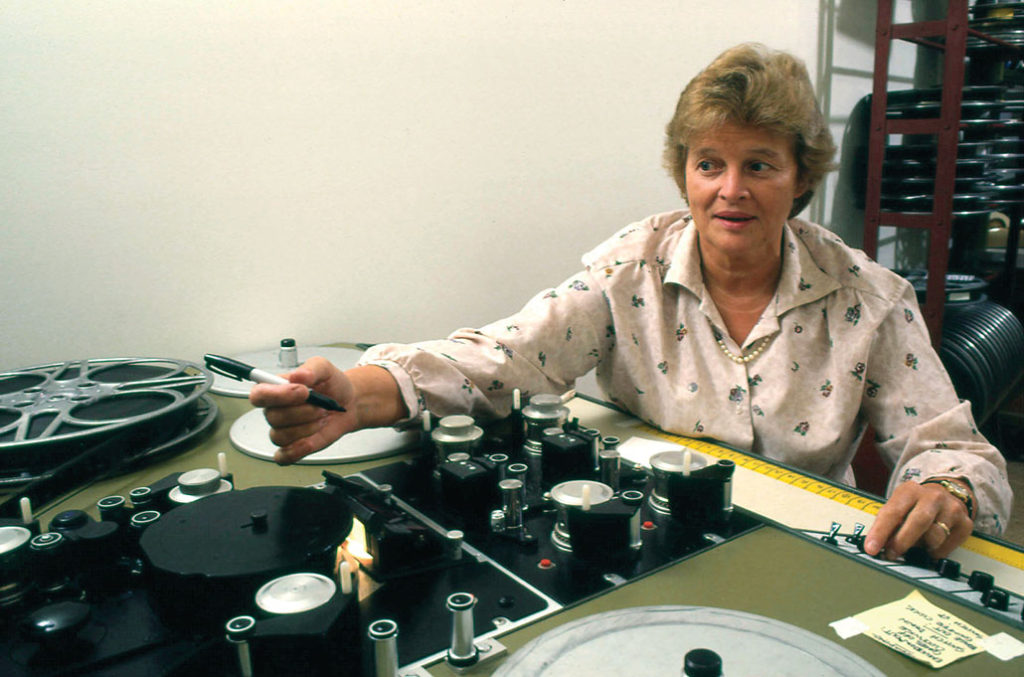
What do you think about the apprenticeships of film editors and how that’s been affected by technology?
That’s interesting. In the old days, if the assistant was busy with something you’d get the apprentice in to hold your trims while you were working and they could kind of watch what you were doing. That’s kind of gone.
The editor is more isolated and your assistants don’t get the opportunity to learn your tricks. Today, for example, would you be able to mentor a Richie Marks, a Jerry Greenberg, a Steve Rotter or a Claire Simpson the way you once did?
I would hope so.
Time is more important than ever. The editor is just trying to produce and there can be very little interaction with the assistant.
I think that is probably true. However, I usually hire assistants that have good taste and I appreciate their involvement. When I had two or three versions I would always call my first and second in – to come and look so they’d be up-to-date on the work. I think that’s terribly important because I trust their opinions and no matter how rushed I was, I always appreciated their feedback.
Sometimes the director’s yearning for immediate gratification can cause problems.
On film, directors knew it took a little time to smooth something out or to perfect a cut, but now because digital makes the act of cutting faster, their expectations have grown. When you’ve got six versions of a scene and the soundtracks are still incomplete – they lack fluidity – and the director says, ‘don’t bother fixing the sound, do it later’ – you could be up all night trying to perfect those scenes. That can be very frustrating.
When you’re making changes and you have say six or seven tracks, it can get pretty hard to keep everything in sync.
I got quite fast at making those changes, but when you’re completely re-cutting something and you have a lot of tracks, it does take time.
“Keep working. And stay positive. You can over-estimate where you should be, but if you can’t be there yet – don’t become bitter and don’t become negative because that can kill you personality-wise.” – Dede Allen
How has the digital revolution affected the editor’s relationship to the finishing of a film, primarily in sound?
Well, we had a fantastic sound crew. So as far as I’m concerned, it didn’t really change the relationship – I worked as closely as I could, but because the director was so busy constantly making changes, I was not able to attend the temp dubs or the ADR sessions. I was there for all of the dialogue pre-dubs, but I wasn’t for all the effects pre-dubs. But if you have a crew like I had, you don’t have to worry about how the effects are going to come out.
Sound editors and mixers are also suffering from the pressure that comes from the illusion that everything can be done instantaneously. The directors don’t really understand that it can take more than a punch of the button to fix subtle problems.
Well, actually, my experience with Curtis was that he does understand sound. He’s very good on that.
There’s artistry to a lot of this work and that takes time.
Oh my God, are you kidding? It’s tremendously artistic – how you meld ADR with original sound, how you create seemingly infinite but disparate layers to sound – all that takes artistry, and most important, time.
Sound is such an enormous part of the process. But then I have always enjoyed working with mixers – the mix has always been one of my favorite processes. I call it ‘the final exam.’
Is there any advice that you have in this new age on how to become a good editor?
Well, I would give the same advice I gave in the old days which is learn where the scene is. See plays as much as you can, good plays, because that’s where you’ll really find out about the three act form and learn about performance – even though it’s very different on film. Anybody can learn the tools. Look, if I can learn the Avid, anybody can learn the tools. I didn’t even type, you know.
“The market is changing rapidly and, as a result, younger editors are beginning to cut earlier.” – Dede Allen
You’re talking about storytelling.
Storytelling, performance and good taste are the key to being a good editor. If you don’t have the opportunity, if you’re part of a culture where you can’t get to the theater easily, make sure you try to.
These suggestions are pertinent even though filmmaking is changing.
Absolutely. Drama is drama. And comedy is comedy. Whether it’s The Blair Witch Project, Being John Malkovich or American Beauty, the three-act form is still the center of story telling and performance is its soul. I also have one other piece of advice. Never feel above something. In other words, when you think you’re ready for something, but you can’t get the job because there are other people who have already gotten the job, don’t feel like you’re never going to get a chance. There is a tremendous amount of disappointment in the present generation. A journalist who interviewed me for something said he had been talking to some assistants in New York and he was kind of shocked by their manner. Both assistants complained of everything being so unfair. They felt that they had studied in college etc., but nobody had taken them on, no one had given them a break. They were very unhappy and feeling sorry for themselves. I’m sure they’re very good assistants and New York is a hard place to work now. But they shouldn’t feel automatically entitled to being mentored. What’s important is to keep working. A career evolves out of a variety of experiences.
That’s good advice. Keep working.
Yes, keep working. And stay positive. You can over-estimate where you should be, but if you can’t be there yet – don’t become bitter and don’t become negative because that can kill you personality-wise. It can not only hurt your work; it can hurt your relationships with people who can help you.
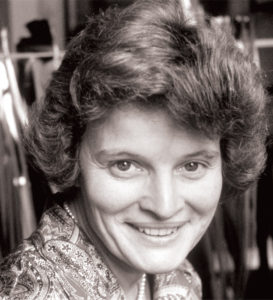
I remember a wise man once said to me, ‘Don’t under-estimate the power of luck.’
That’s right. Luck has a lot to do with it. If I hadn’t gotten a chance to work with Bob Wise because Carl [Lerner] was doing Middle of the Night, my whole life might have been different. I remember that at the time my friends didn’t take me seriously because Bob Wise was known as a great editor, so of course they thought I didn’t edit the film. It took two or three pictures before they began realizing that maybe I was contributing something. I was also much older when I started. I was 34 before I got my first big picture.
I understand that Napoleon would choose his generals by lining them up before battle and asking each one if he felt lucky. The ones who did were the ones he put in command.
That’s because they had confidence.
That’s it. It’s a state of mind.
That’s right. That’s true. I have been very lucky. And I was always surprised by it, I always felt, ‘Gee how did I get such a break?’ And I still feel that way. I’ve had a very lucky career because I’ve been able to work with so many great people. Obviously I learned a lot from them. But I was just under 19 when I started and it took me a very long time before I got a chance to work on features.
I guess what you’re saying is that you should always work towards your goal.
That’s right. But don’t be dissuaded because luck can come your way at any time.
On May 11th Dede participated in a Fireside Chat at Paramount Studios.
Go to A Fireside Chat with… Dede Allen


